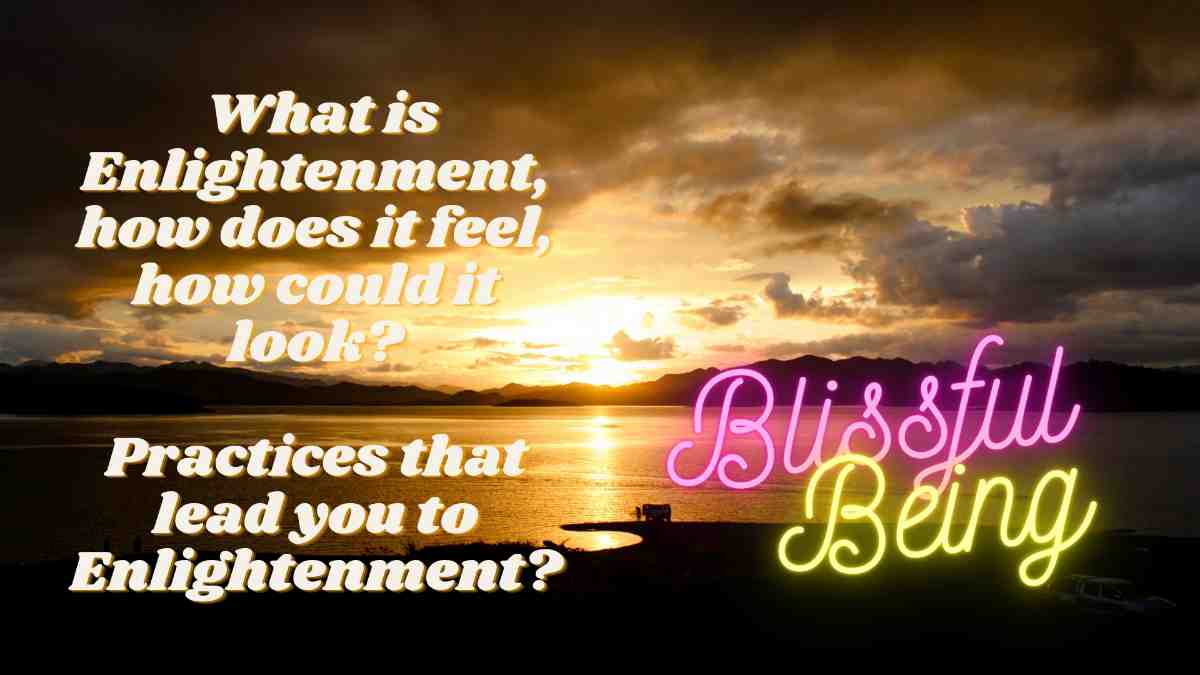Enlightenment is often described as a state of consciousness characterized by:
A deep sense of inner peace: Enlightened individuals often describe feeling a deep sense of inner peace and contentment, regardless of external circumstances.
An awareness of the interconnectedness of all things: Enlightened individuals often describe feeling a sense of oneness with the universe and an awareness of the interconnectedness of all things.
A sense of freedom from attachment and suffering: Enlightened individuals often describe feeling a sense of freedom from attachment to material possessions, ego, and the illusion of separateness. This can lead to a sense of freedom from suffering.
A sense of love and compassion for all beings: Enlightened individuals often describe feeling a sense of love and compassion for all beings, and a desire to serve others and alleviate suffering.
A deep understanding of the nature of reality: Enlightened individuals often describe having a deep understanding of the nature of reality and the true nature of the self.
It’s important to note that these experiences are subjective and may vary from person to person. Additionally, the experience of enlightenment may not necessarily be a permanent state and may require ongoing practice and cultivation.

What is Enlightenment?
Enlightenment is a term that is often used in spiritual and philosophical contexts to describe a state of profound understanding or awareness. It is a state of consciousness that transcends the limitations of the ego, and brings about a sense of unity with all things. In many spiritual traditions, enlightenment is seen as the ultimate goal of human existence.
The term “enlightenment” can refer to different concepts depending on the cultural, religious or philosophical context in which it is used. In some Eastern philosophical and religious traditions, enlightenment is often associated with the attainment of a state of consciousness known as nirvana or moksha, which involves the dissolution of the self and the realization of ultimate reality. In Western philosophical and spiritual traditions, enlightenment is often associated with the attainment of a state of intellectual or moral understanding, in which one has gained a deep insight into the nature of reality, ethics or the human condition.
While the concept of enlightenment varies across different traditions and schools of thought, it generally involves a profound shift in one’s perspective or worldview, as well as a deep transformation of one’s consciousness and understanding of oneself and the world.
Thoughts on how to become enlightened?
Here are some general practices that are often associated with the pursuit of enlightenment:
Meditation: Meditation is a practice that involves focusing the mind on a particular object or thought to achieve a state of calmness and clarity. Many traditions consider meditation to be a key practice for achieving enlightenment.
Mindfulness: Mindfulness involves being fully present and aware of the present moment, without judgment or distraction. This practice can help cultivate a deeper sense of awareness and clarity.
Self-inquiry: Self-inquiry involves questioning one’s thoughts, beliefs, and identity to gain a deeper understanding of the self and the nature of reality. This practice can help to dissolve the ego and cultivate a deeper sense of interconnectedness.
Service: Serving others with kindness and compassion can help to cultivate a sense of empathy and interconnectedness with others. Many traditions consider service to be a key practice for achieving enlightenment.
Study: Studying spiritual texts and teachings can help to deepen one’s understanding of spiritual principles and practices. This can help to cultivate a deeper sense of wisdom and insight.
Surrender: Surrendering to a higher power or greater purpose can help to cultivate a sense of trust and surrender to the universe or a higher power. This practice can help to cultivate a deeper sense of peace and acceptance.
It’s important to note that enlightenment is a subjective and individual process that may take time and practice. It’s important to find practices that resonate with you and to approach the process with patience and openness. Additionally, seeking guidance from a qualified spiritual teacher or mentor may be helpful in the pursuit of enlightenment.
In new age belief systems, an enlightened being is often associated with positive qualities such as love, compassion, wisdom and joy. Here are some characteristics that may be attributed a high vibrational being…
Love and compassion: Enlightened beings are often believed to emanate an abundance of love and compassion towards all living beings.
Wisdom: These beings are believed to possess profound wisdom and knowledge of the universe and the laws that govern it.
Enlightenment: High vibrational beings are often associated with enlightenment or spiritual awakening, having transcended the limitations of the physical world and attained a higher state of consciousness.
Non-judgmental: They are often believed to be free from judgment, criticism, or negativity towards others.
Gratitude and joy: High vibrational beings are often associated with feelings of joy and gratitude, recognizing and appreciating the beauty and wonder of life.

7 Comments
vorbelutrioperbir
June 26, 2024Perfectly written subject material, thankyou for entropy.
Guy Sohm
June 29, 2024Thanks
tlovertonet
February 21, 2025You can definitely see your skills within the work you write. The world hopes for even more passionate writers like you who aren’t afraid to mention how they believe. All the time go after your heart.
Guy Sohm
February 21, 2025Wow what a lovely comment, really appreciate your kind words and encouragement.
Bless your heart and soul
Kindly Guy
Guy Sohm
February 21, 2025So happy to hear that its helpful, bless
zoritoler imol
February 28, 2025Great write-up, I?¦m normal visitor of one?¦s web site, maintain up the nice operate, and It’s going to be a regular visitor for a lengthy time.
Guy Sohm
March 5, 2025Thanks for your kindness
Leave A Response